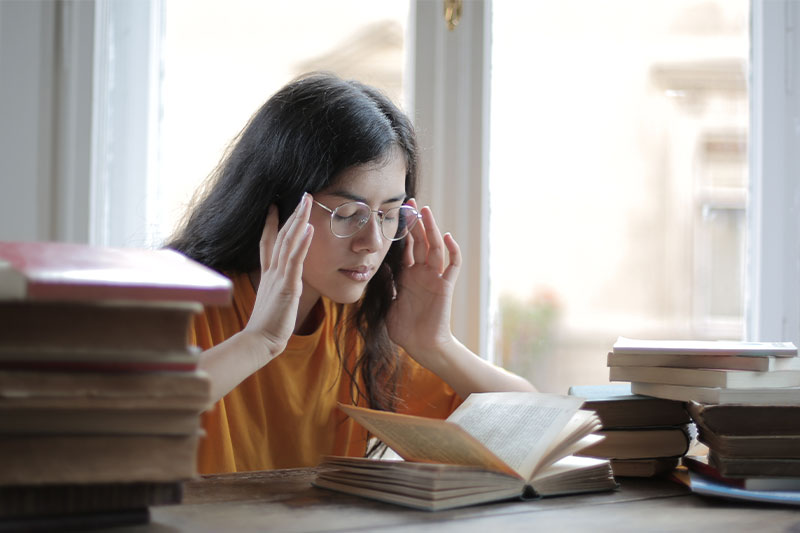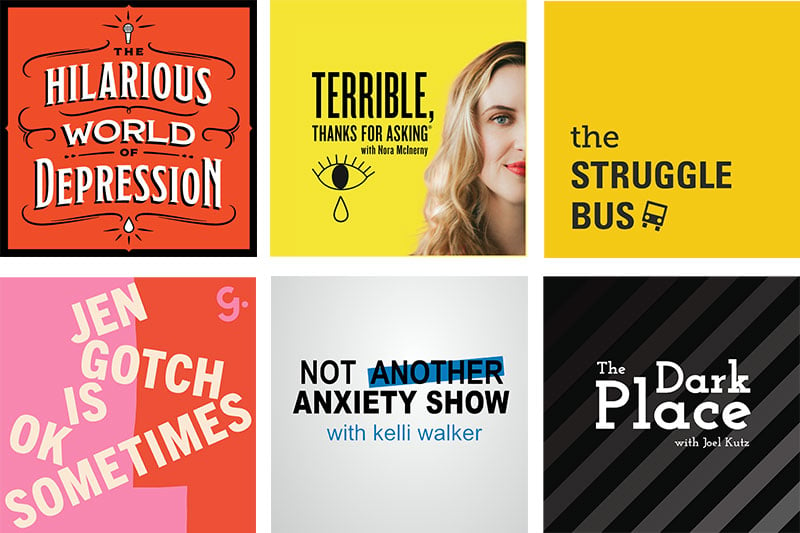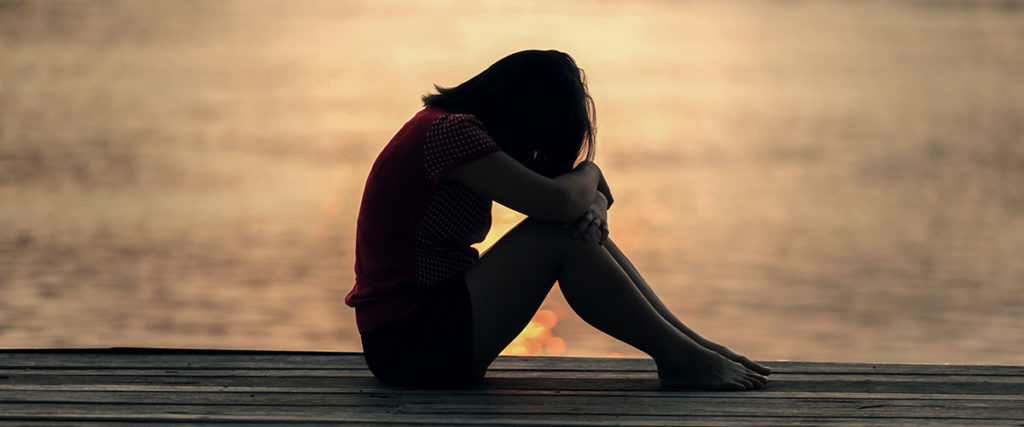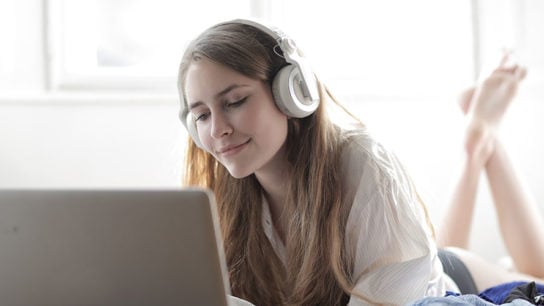When you struggle with anxiety and stress, it’s easy to feel like you’re alone. These holistic self care resources will help you banish your worries and find calm in a chaotic world.
According to the World Health Organization, anxiety is the most common mental illness globally, affecting an estimated 275 million people worldwide. Defined as ‘a feeling of worry or nervousness,’ anxiety refers to the body’s natural reaction to stress and can manifest in several subtle forms, ranging from the constant feeling of being on edge to an inability to sleep or excessive brooding.
We’ve rounded up some of the best self care resources to reduce your anxiety and smooth your way in your mental health journey.
Identifying 7 Common Anxiety Triggers
Understanding your triggers and how they work can help you better manage your anxiety and learn new ways to cope. Here are 7 anxiety triggers that often slip under the radar.
Caffeine
If you often find yourself reaching for a second cup of coffee, you might want to think twice. While caffeine can give you a much-needed jolt of energy, research has shown that jitters stemming from overconsumption of caffeinated beverages can trigger a fight or flight response, resulting in symptoms such as irritability and restlessness that may be indistinguishable from those of anxiety disorders. As a stimulant, caffeine can also exacerbate existing anxiety disorders, triggering bodily sensations – such as sweaty palms, pounding chest, dizziness – that may lead up to a full-blown panic attack. Finding yourself relying heavily on highly caffeinated beverages? Consider these alternatives.

Lack of Exercise
While it can be tempting to laze around, it’s important to incorporate physical activity into your daily life. Exercise helps your body to release endorphins that give you a feeling of happiness and has been known to alleviate anxiety. Being sedentary, on the other hand, can be detrimental to your mental health. Studies have shown that the average adult needs 30 minutes of daily exercise, but don’t worry – you don’t need to hit the gym to be active. Instead, choose a form of physical activity that suits your lifestyle, whether it be going on an early morning hike, going geocaching over the weekend, taking your dog for a walk or even throwing impromptu dance parties with friends! There are also plenty of workout routines that can be done right at home.
Physical Clutter
The environment you create is a reflection of your mindset. According to a 2019 study, physical environments can have a direct influence on your emotions and behaviours. Research from Princeton University further found that individuals experienced decreased performance and increased stress when surrounded by physical clutter. A cluttered environment can translate into a cluttered mind, and may in turn negatively affect your mood, which is why it can be helpful to put extra time into cleaning up your surroundings. Making sure your surroundings stay clutter–free can help to relieve unnecessary tension and can even lead to higher focus and productivity.
Smartphone Apps
A subtle yet significant contributor to a cluttered mental environment is the apps on your phone. A 2017 study found that the average smartphone user has over 80 apps on their phone, yet less than half of these apps are frequently used. Deleting unnecessary apps from your phone can help minimise the distractions you face whenever you unlock your screen, leaving you more room to focus on the more important things in your life. You may also want to consider categorising your apps and keeping only the most important ones on your home screen. With instant access to distractions like social media, it may be helpful to move these time–wasting apps to another page to avoid falling down a rabbit hole every time you check your phone. Here are some other ways to detox digitally.
Social Media
Nowadays, our smartphones offer instant access to distractions like social media, making it easy to fall down a rabbit hole. Constant notifications can make it tempting for you to repeatedly reach for your phone, taking up hours of your time as you mindlessly refresh your Instagram page or scroll through your Facebook timeline for the twentieth time that hour. It’ll come as no surprise that too much screen time can be detrimental to your physical and mental health. A UK study found that those who rely heavily on social media often end up negatively comparing themselves to others, and may find it stressful to disconnect, with many even experiencing insomnia. Cutting down on screen time can help you to destress and unwind, improving mental awareness and leading to better productivity in the long run.
Social Isolation
Loneliness and social isolation are often both a cause and a symptom of anxiety. While it’s important to take some time alone to rest and recover, isolating yourself from others during stressful times can actually aggravate your overall anxiety levels. Humans are social creatures by nature – having strong connections with others has been proven to alleviate symptoms of depression and anxiety and, according to a study by Harvard Health, even helps to boost physical health and increase longevity. Conversely, social isolation has been linked to illness and premature death, sharing the same level of risk as obesity, high blood pressure, and smoking. Spending quality time with others, whether it be in person or through a screen, is a simple yet effective way of relieving stress.
Inadequate Sleep
While going to sleep makes up the last part of your day, it’s certainly not the least. Anxiety and sleep are inextricably linked in an endless cycle; studies show that stress and anxiety may cause sleeping problems or worsen existing problems – and having an anxiety disorder can further exacerbate the problem. Getting adequate sleep is vital to our overall health and well–being and can lead to improvements in mental health. Often hailed as a fundamental part of self–care, developing healthy sleep habits can help refresh and energise you for the day, so make sure you’re getting enough rest – experts recommend 7 to 9 hours of sleep per day. Feeling restless? Try these apps and podcasts to help you doze off.
Implementing 7 Tips To Eliminate Stress
While we can’t avoid all sources of stress from our lives, there are some quick and easy ways to better mitigate it. Here are 7 research-backed techniques you can implement today in your journey towards eliminating stress from your daily life.
Identify Your Triggers
The first step to managing your stress is to find out exactly what is causing it. Learn to recognise your triggers by recording your reactions and the events leading up to it. While it’s common to get anxious over certain situations – for instance, if you’re running late to work or are gearing up for a big presentation – some anxiety triggers are subtle and can easily go unnoticed if we’re not careful, which is why it’s important to figure out exactly what is bothering you. After coming up a list of your top triggers, you can start to work on eliminating these stresses from your life or to learn to change your reactions to them.
Cut Out Negativity
Sometimes, the best way to eliminate stress is simply by cutting out the root of your stress from your life, whether it be toxic relationships, unhealthy habits or self-destructive thoughts. Removing things that are contributing to your stress can help you achieve peace and introduce positivity into your life. Keep an eye out for those who bring toxicity into your life – take an honest look at the people in your life and decide which relationships are worth maintaining. Wean off habits that don’t bring value to your life and introduce healthy habits into your routine. When you find yourself thinking negatively, take a moment to focus on the positive. Making changes to your thoughts and surroundings is instrumental in stress management.
Set Boundaries
We often undervalue our own time, choosing to overcommit to others and saving little to no time for ourselves. Setting healthy boundaries plays a crucial role in your mental wellbeing by letting you focus on your own emotional, psychological, and physical needs rather than the needs of others. If you’re constantly finding yourself feeling overwhelmed by your obligations, whether it be in a romantic relationship, at work with colleagues, or with family or friends, it’s high time for you to commit to setting – and maintaining – firm boundaries with the people in your life. Learning to say no to others and learning to leave self–nurturing downtime for yourself can help relieve stress by reducing your workload, helping you to manage your time more efficiently and allowing you to pay attention to the things most important to you.
Practice Gratitude
It’s easy to find yourself stressing out over negative situations in your life. One of the simplest ways to Introduce positivity into your life is by learning to feel thankful for what you have. Practising gratitude can reshape your mindset in a positive way by helping you focus on appreciating the things already in your life, rather than feeling unsatisfied and constantly hoping for something new. In fact, studies have shown that practising gratitude can lead to numerous benefits, such as alleviating symptoms of anxiety and depression and sharpening brain function, as well as improving relationships and boosting your overall happiness levels. Whenever you catch yourself fixating on a stressful situation in your life, such as an argument with a friend, try to think of the parts of the friendship that you are grateful for.
Stop Procrastinating
According to the Association for Psychological Science, those who are prone to procrastination tend to have higher levels of stress and lower well-being. Procrastination is one of the biggest contributors to stress – when you constantly put off important tasks, your stress levels can skyrocket, which can further distract you from completing the tasks at hand, thereby causing more stress. This makes it easy to fall into the ‘procrastination accumulation effect’, a vicious cycle that leaves you feeling even more overwhelmed. To help get out of this harmful cycle, try adopting a ‘do-it-now’ habit and work on your most important tasks first.
Declutter
Research from Princeton University found that individuals experienced decreased performance and increased stress when surrounded by physical clutter. A cluttered environment can translate into a cluttered mind, and may in turn negatively affect your mood, which is why it can be helpful to put extra time into cleaning up your surroundings. Setting aside 15-20 minutes at the end of each day to declutter your surrounding areas is a manageable way to remove a subtle – but significant! – energy drain from your life. Making sure your surroundings stay clutter–free can help to relieve unnecessary tension and can even lead to higher focus and productivity, making it a safe, stress-free place to relax and unwind.
Meditate Mindfully
Mindful meditation refers to the practice of slowing down your thoughts, releasing feelings of negativity and achieving inner peace. Studies have shown that practising intermittent meditation during the day can help to relieve symptoms of stress and anxiety, as well as to stimulate focus and improve sleep. Having long been hailed as a way to improve both your mental and physical health, meditation techniques vary but generally involve deep breathing, muscle relaxation and self–awareness. As it may be difficult to get started – especially if you find yourself having to set aside extra time and effort to meditate – you can begin by allocating small moments for meditation into your existing routine. Once you get used to meditating daily, you can start to extend your sessions.
11 Wellness Tools for Mental Health
If you’re struggling with anxiety, grief, or depressive feelings, then tune in to one of these amazing podcasts or apps, all of which were designed to cater to your mental wellness needs.

The Hilarious World Of Depression (Podcast)
Depression isn’t exactly a bundle of laughs… or is it? Comedian and writer John Moe ventures to answer this question with The Hilarious World of Depression, a podcast that seeks to destigmatise mental illness by looking at it through a humorous lens. In an effort to offer a refreshing perspective on depression and anxiety, John invites celebrity guests to have frank conversations about their experiences in dealing with mental health issues. By taking a lighthearted approach when opening up about serious topics, this show successfully offers a sense of community and solace for those who may also be suffering.
Available on: Stitcher, Spotify, Google Podcasts
Terrible, Thanks For Asking (Podcast)
When people ask how you’re doing, you may often find yourself feeling obligated to reply with some variation of “Fine, thank you.” In Terrible, Thanks for Asking, author Nora McInerny urges listeners to be honest about their struggles and to break the taboo of telling others how you truly feel inside. Having lost her husband, her father and a pregnancy in the span of a year, Nora is no stranger to grief. With each episode centred around stories of emotion, mental illness, and loss, she speaks about finding hope, community, and happiness after traumatic experiences.
Available on: Apple Podcasts, Stitcher, Spotify, Google Podcasts, iHeartRadio
The Struggle Bus (Podcast)
All aboard The Struggle Bus! Featuring co-hosts Katharine Heller and Sally Tamarkin, this weekly podcast is centred around self-care and navigating the daily challenges of living with mental illness. In each episode, the two best friends answer listener questions, tackling a wide range of topics from friends and family to love and work. The chatty duo offer a fun and conversational atmosphere in their quest to normalise discussions about mental health.
Available on: Apple Podcasts, Stitcher, Google Podcasts, iHeartRadio
Jen Gotch is OK… Sometimes (Podcast)
Ban.do founder Jen Gotch’s wit, quirkiness, and candour shine through in her podcast, where she opens up about her lifelong struggle with bipolar disorder, depression, and anxiety. Jen first rose to fame when she took to Instagram to share her personal battle with mental illness in an effort to normalise mental health issues. Having suffered from mental disorders for most of her life, Jen hopes to help followers who face similar struggles feel less alone.
Available on: Apple Podcasts, Stitcher, Spotify, Google Podcasts
Not Another Anxiety Show (Podcast)
Like the name suggests, this podcast is mainly focused around anxiety. Hosted by registered nurse and wellness coach Kelli Walker, this show centres its discussions around anxiety issues and panic attacks. As a former agoraphobe, Kelli is well aware of the struggles one can face when dealing with anxiety. She aims to help listeners navigate their symptoms by providing relaxation tools like breathing exercises and meditation techniques, as well as by providing comfort and support to those who need it most.
Available on: Apple Podcasts, Stitcher, Google Podcasts, Player FM
The Dark Place (Podcast)
On The Dark Place, host Joel Kutz invites ordinary people to share their personal stories with depression, anxiety, trauma, and abuse. Aiming to offer a friendly voice to those in need, this show was created shortly after Joey spent a year volunteering for the National Suicide Prevention Hotline. In each episode, he invites his guests, who are often listeners of the show, to navigate open and honest discussions about their struggles and experiences with mental illness, which are always met with his genuine compassion and kindness.
Available on: Apple Podcasts, Stitcher, Google Podcasts, Player FM
Sanvello (Mobile App)
Boasting over 3 million users, Sanvello is the number 1 app for dealing with stress, anxiety, and depression. Sanvello provides clinically validated techniques to help users manage their moods and thoughts, and is packed with expert lessons on mindfulness, daily mood, and health trackers, and community boards where users can share their stories with others. For those seeking professional help, the app also includes a directory through which users can find a therapist local to their area.
Available: iOS and Android
Aloe Bud (Mobile App)
With its retro 8-bit graphics and soft colour scheme, Aloe Bud is an adorably designed app that seeks to bring awareness to the importance of mindfulness and self-care. An ‘all-in-one, self-care pocket companion,’ this app makes use of push notifications to provide gentle daily reminders for activities like drinking water, eating on time, reaching out to friends, and taking breaks. Aloe Bud also provides an activity log so that users can log their daily progress and reflect on their achievements.
Available: iOS, with plans to expand to Android
Youper (Mobile App)
Designed in collaboration with doctors, scientists, and engineers, Youper labels itself as an ‘emotional health assistant’ that is designed to help users identify, track, and process their emotions and behaviour through quick conversations with its AI-powered chatbot. By analysing the users’ thoughts and feelings, Youper can identify and monitor patterns to help users reach a healthier state of mind, providing an entirely personalised experience.
Available: iOS and Android
Stoic (Mobile App)
A beautifully designed and comprehensive mental health tracker, the Stoic app is rooted in the ancient Greek philosophy of Stoicism, which argues that as the world is inherently unpredictable, we cannot control or rely on external events. Rather, one can only control one’s own mind and choose one’s own behaviour to navigate through these unexpected events. The app seeks to help users manage their negativity by keeping track of their thoughts and actions through reflective exercises such as meditation, mood tracking and breathing exercises, and a strong focus on journaling to give users some insight into the main factors that influence their emotions.
Available: iOS
Calmer You (Mobile App)
The latest brainchild of Nick Begley, former head of research at Headspace, Calmer You is an app dedicated to helping users build an anxiety-free future. Turning self-development books into actionable, app-based courses, Calmer You incorporates mindfulness and CBT techniques, helping users form positive habits that continue to help them self-regulate their anxiety. With everything from self-compassion exercises to cognitive behavioural therapy, mindfulness techniques to diaphragmatic breathing, the app provides its users with techniques to break down their worries, boost their self-esteem, relieve their physical symptoms of anxiety, and help them make decisions.
Available: iOS and Android
Related Articles
Self Care Activities: 70 Ways to Cope Better with Stress





